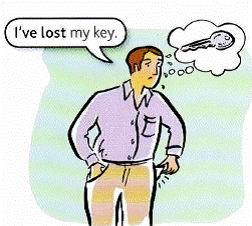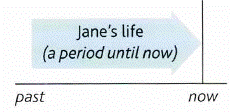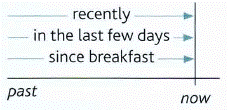The present perfect tense / Даний вчинене час – Вживається для вираження дії або явища, що мав місце до моменту мовлення і якимось чином пов’язаний з моментом мовлення, що має для нього актуальне значення. Точний час дії не вказується.
Читайте нову статтю Present perfect з вправами і відповідями.
Has your sister left for Moscow? Виїхала ваша сестра в Москву?

present perfect tense
Ben is looking for his key. He can’t find it.
He has Lost his key.
He has Lost his key= He lost it recently, and he still
doesn’t have it.
Have/has Lost is the present perfect simple:

present perfect tense / Даний вчинене час може вживатися :
— без зазначення часу вчинення дії:
Have you done your homework? Ви зробили ваше домашнє завдання?
— з прислівниками невизначеного часу:
ever(коли-небудь) / never(ніколи) / often(часто) / already(вже) / yet(ще –в негативних пропозиціях, вже – в питальних) / just(тільки що) / lately(нещодавно)/
She’s just come back from Italy. Вона щойно повернулася з Італії.
— з обстоятельственными словами, що позначають ще не минулі періоди часу:
today / this week / this month /
She hasn’t made any phone calls this week. Вона не кому не дзвонила на цьому тижні.
Запам’ятайте що present perfect tense / Даний вчинене час не вживається в питальних реченнях, що починаються з прислівники when, оскільки в даному випадку повинно бути вказано точний час здійснення дії.
present perfect tense найчастіше переводиться на російську мову дієсловом доконаного виду в минулому часі.
She Has come back yet? Вона вже повернулася?
present perfect
I/we/they/you have (=i’ve, we’ve, etc.) – been, forgotten, written, work, etc.
He/she/it has (= he’s, she’s etc.) – been, forgotten, written, work, etc.
When we say that ‘has something happened’, this is usually new information:
Ow! I’ve cut my finger.
The road is closed. There’s been (there has been) an accident.
(from the news) Police have arrested two men in connection with the robbery.
When we use the present perfect, there is a connection with now. The action in the past has a result now:
‘Where’s your key?’ ‘I don’t know. I’ve Lost it.’ (=I don’t have it now)
She told me her name, but i’ve forgotten it. (= I can’t remember it now)
‘Tom Is here?’ ‘No, he’s gone out.’ (=he is out now)
I can’t find my pen. Have you seen it? (= Do you know where it is now?)
Note the difference between gone (to) and been (to):
Ellen is on holiday. She has gone to France. (= She is there now or on her way there)
Tome is back home now. He has been to Italy. (=he has now come back)
You can use the present perfect with just, already and yet.
just = a short time ago:
‘Are you hungry?’ ‘No, i’ve just had lunch.’
Hello. Have you just arrived?
We use already to say that something happened sooner than expected:
‘Don’t forget to pay your electricity bill.’ ‘I ‘ve already paid it.’
‘What time is Sara leaving?’ ‘She’ s already Left.’
Yet = until now. Yet shows that the speaker is expecting something to happen. Use yet only in questions and negative sentences:
Has it stopped snowing yet?
She’s written the email, but she haven’t sent it yet.

Діалог із застосуванням часу: Present perfect tense
Jane: Have you travelled a lot, Еллен?
Ellen: Yes, i’ve been to lots of places.
Jane: Really? Have you ever been to France?
Ellen: Yes, i’ve been to France once.
Jane: What about Japanese?
Ellen: No, I haven’t been to Japanese.
When we talk about a period of time that continues from the past until now, we use the present perfect (have been I have travelled etc.).
Have you ever eaten apple pie?
We’ve ever had a dog.
Been (to)= відвідали:
I’ve never been to Egypt. Have you been there?
In the following examples too, the speakers are talking about a period that continues until now
(recently / in the Last few days / so far / since breakfast etc.):

Кілька прикладів вживання Present perfect
Have you heard from anything Ann recently?
I’ve met a lot of people in the Last few months.
Everything is going well. We haven’t had any problems
so far.
I’m hungry. I haven’t eaten anything since dinner.
(=from dinner until now)
It’s good to see you again. We haven’t seen each other for a Long time.
In the same way we use the present perfect with today I this evening I this year etc. when these periods are not finished at the time of speaking

I’ve drunk five cups of juice today.
Have you had a holiday this month?
I haven’t seen David this afternoon. Have you?
Tom hasn’t worked very hard this term.
We say:
It’s the (first) time something has happened.
Розглянемо приклад з Елен

Ellen is having a driving lesson. It’s her first one.
It’s the first time She has driven a car. (not drives)
or She has never driven a car before.
Tom has lost his passport again. This is the fourth
time this has happened. (not happens)
Jane is phoning her boyfriend again. That’s the second
time she’s phoned hem this evening.
Подивіться відео урок Present perfect для кращого засвоєння матеріалу

